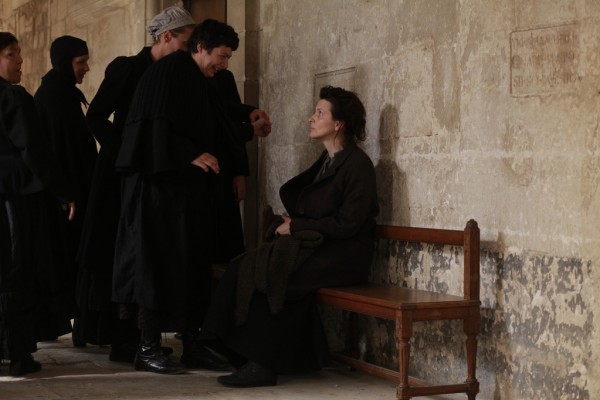CAMILLE CLAUDEL 1915 (Bruno Dumont, 2013)
Film Forum
209 West Houston St.
October 16-29
212-727-8110
www.filmforum.org
www.kinolorber.com
 Juliette Binoche gives a gut-wrenching performance as the traumatized title character in Bruno Dumont’s heartbreaking Camille Claudel 1915. The film takes place over the course of several days in 1915, as the sculptor and former mistress of Auguste Rodin awaits a visit from her younger brother, poet, devout Christian, and diplomat Paul Claudel. Camille has been moved to an asylum in Montdevergues, where she prepares her own meals for fear of being poisoned on orders from Rodin, who she believes is still trying to ruin her life and career twenty years after their personal and professional relationships ended. Run by nuns, the asylum is home primarily to deeply disturbed women incapable of taking care of themselves and barely able to speak coherent sentences. Claudel, a loner who was committed by her family shortly after the death of her father, desperately wants to be released and get her life back, but everything seems to be poised against her. Binoche, her pale face appearing to have been chiseled like one of Claudel’s sculptures, plays Camille with a subtle yet stern beauty, giving several long, impassioned speeches that writer-director Dumont (Twentynine Palms, L’humanité) and cinematographer Guillaume Deffontaines shoot in single takes, the camera remaining still, Camille framed like a painting. Throughout the film, Camille is seen amid mostly blacks, grays, browns, and whites, a monochromatic color scheme that echoes her work. The film has a cinéma vérité feel, as much of the sparse dialogue is improvised, many of the nuns are nurses at the asylum, and several of the patients are actually committed there, lending a neo-Realist quality to the austere setting. The film, which is “freely adapted from” Paul’s writings and letters, Camille’s letters, and medical records, is not a biopic; instead, it’s a fascinating study of a talented artist and the mental anguish that ultimately overwhelmed her.
Juliette Binoche gives a gut-wrenching performance as the traumatized title character in Bruno Dumont’s heartbreaking Camille Claudel 1915. The film takes place over the course of several days in 1915, as the sculptor and former mistress of Auguste Rodin awaits a visit from her younger brother, poet, devout Christian, and diplomat Paul Claudel. Camille has been moved to an asylum in Montdevergues, where she prepares her own meals for fear of being poisoned on orders from Rodin, who she believes is still trying to ruin her life and career twenty years after their personal and professional relationships ended. Run by nuns, the asylum is home primarily to deeply disturbed women incapable of taking care of themselves and barely able to speak coherent sentences. Claudel, a loner who was committed by her family shortly after the death of her father, desperately wants to be released and get her life back, but everything seems to be poised against her. Binoche, her pale face appearing to have been chiseled like one of Claudel’s sculptures, plays Camille with a subtle yet stern beauty, giving several long, impassioned speeches that writer-director Dumont (Twentynine Palms, L’humanité) and cinematographer Guillaume Deffontaines shoot in single takes, the camera remaining still, Camille framed like a painting. Throughout the film, Camille is seen amid mostly blacks, grays, browns, and whites, a monochromatic color scheme that echoes her work. The film has a cinéma vérité feel, as much of the sparse dialogue is improvised, many of the nuns are nurses at the asylum, and several of the patients are actually committed there, lending a neo-Realist quality to the austere setting. The film, which is “freely adapted from” Paul’s writings and letters, Camille’s letters, and medical records, is not a biopic; instead, it’s a fascinating study of a talented artist and the mental anguish that ultimately overwhelmed her.
